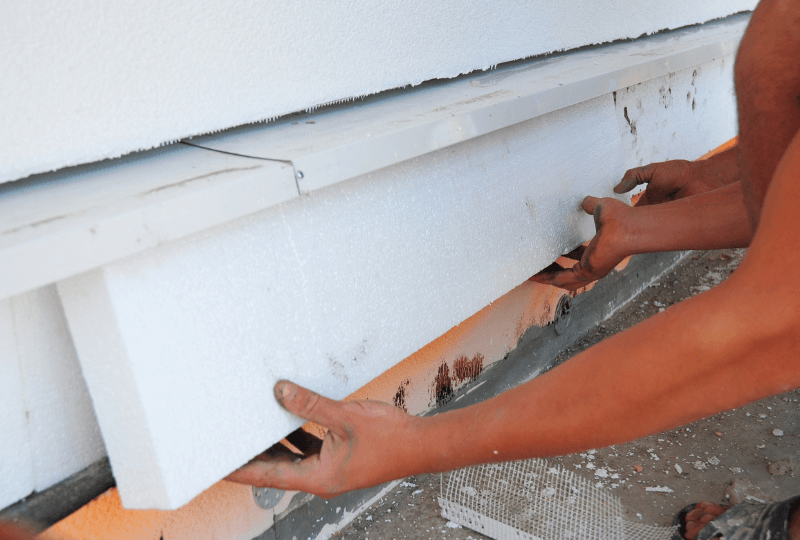
When it comes to home improvement, addressing your home’s foundation is crucial. From minor issues to potential structural damage, homeowners often face various challenges related to foundation repair. Identifying the warning signs can provide peace of mind, ensuring the structural integrity of your residence remains uncompromised.
As soil conditions change or tree roots expand, they can impact the foundation. From expansive clay to excess moisture, multiple factors can precipitate foundation problems. With this guide, learn how to identify these problems and understand fixing house foundation terms.
Fixing House Foundation in Nebraska
Nebraska homeowners frequently encounter foundation issues, particularly due to the state’s unique soil conditions. Over time, as the ground shrinks or becomes saturated with moisture, it can cause foundation settlement or even lead to significant foundation damage.
Foundation Cracks
One of the most tell-tale signs of foundation problems is the appearance of small cracks or horizontal cracks in your foundation walls or drywall. While small cracks might seem benign, they can widen over time, causing water damage, especially if not sealed with epoxy or sealant.
Water Damage
Poor drainage, exacerbated by inefficient gutters and downspouts, can accumulate water around the foundation. Over time, this can weaken basement walls, causing bowing walls or further foundation settlement. Basement waterproofing is a preventive measure homeowners can adopt to avoid these issues.
Foundation Repair Methods
Are you wondering how to repair the foundation? Fixing a house’s foundation is not a simple task. Depending on the extent of the damage and the type of house foundation—be it concrete foundation, slab foundation, or crawl space—homeowners can choose from several house foundation repairs.
Slabjacking and mudjacking involve injecting grout beneath the concrete slab to raise it. In contrast, underpinning uses helical or hydraulic piers to stabilize and lift the foundation.
Consulting Experts
If you notice any warning signs of foundation problems, it’s crucial to consult a structural engineer or a foundation repair contractor. They can conduct a comprehensive foundation inspection, ensuring you understand the foundation repair cost and the best way to repair a home’s foundation. If you’re a resident looking to sell your Lincoln house for cash, addressing these foundation problems beforehand can increase the property’s value.
DIY vs. Professional Help
While DIY methods, like crack repair with sealant or polyurethane foam, can be tempting for minor issues, major repairs should be left to foundation repair experts.
Lastly, besides the foundation itself, homeowners should also consider external factors, such as landscaping and driveways. Proper landscaping can prevent excess water from pooling around your foundation, while driveways should be checked for signs of foundation problems like sinking or cracks.
If you’re considering selling, understanding the cost of fixing your house before selling it is paramount. By addressing foundation issues promptly, homeowners safeguard their property and enhance its resale value. With the right knowledge and timely action, you can confidently say goodbye to foundation woes and look forward to a stable, secure home.
Finding the Source of Foundation Problems
Unearthing the root cause of foundation problems is paramount before commencing repairs. Many homeowners might notice the warning signs—like cracks in the walls or uneven floors—but understanding what’s causing these issues is essential for effective resolution.
Soil Conditions
The ground beneath our homes plays a pivotal role in foundation health. Expansive clay soils can expand when wet and shrink when dry, leading to foundation movement. Similarly, soil that shrinks too much can cause spaces beneath the foundation, leading to settling.
Poor Drainage
If water isn’t efficiently directed away from your home through gutters and downspouts, it can accumulate around the foundation. Over time, this can lead to erosion and increase the hydrostatic pressure on basement walls, inducing cracks or bowing.
Tree Roots
Large trees near your home might offer shade and aesthetic appeal, but their roots can disrupt your foundation. As they grow, they can push against the foundation or absorb moisture from the soil, causing it to shrink and affect the foundation.
External Pressure
As soil becomes saturated with water or dries out, it can expand or contract, exerting pressure on the foundation walls. This can lead to horizontal cracks in the foundation or even bowing walls.

Resolving House Foundation Problems
Once the source of the problem is identified, it’s crucial to find effective solutions. Addressing these problems head-on can prevent further damage and save homeowners significant costs when repairing house foundations in the long run.
Proper Water Management
Ensuring that water flows away from the home is crucial. Installing efficient gutters, ensuring downspouts direct water well away from the foundation, and maintaining proper landscaping are all effective strategies.
Underpinning
This method uses steel or helical piers to stabilize and lift the foundation. They are driven deep into the ground until they reach stable soil or bedrock, supporting the compromised foundation.
Slabjacking or Mudjacking
For sunken concrete slabs, mud or concrete is pumped beneath the slab to lift it back to its original position.
Sealing Cracks
Minor cracks can be sealed using epoxy or polyurethane foam. This not only prevents water from seeping in but also reinforces the strength of the cracked area.
Consult a Structural Engineer
If you need clarification on the extent of the damage, consulting with a structural engineer can offer clarity. They can provide detailed insights into the health of your foundation and recommend the best course of action.
Addressing foundation problems might seem daunting, but with the right approach, it’s manageable. Solutions are available to deal with minor cracks or significant structural damage. By understanding the root causes and acting promptly, homeowners can ensure the longevity and safety of their homes.
Remember, when in doubt, always lean on the expertise of foundation repair professionals to guide you through the process.
Average Costs of Foundation Problems
How much does it cost to fix a house foundation? Foundation problems can range from minor cracks to significant structural issues. As expected, the cost to fix a house’s foundation also varies widely depending on the severity of the problem, location, and the method of repair chosen.
Homeowners might spend as little as $500 to $1,000 for minor cracks and sealant work. These are often superficial and don’t threaten the home’s structural integrity but are essential to fix the foundation of the house to prevent water damage and further deterioration.
Moderate foundation repairs, like slab or mud jacking, can run between $2,000 to $7,000. This process involves pumping material under a slab to lift it back into position and is usually done when there’s noticeable sinking.
Underpinning can be more expensive, a method to stabilize and lift a foundation using piers. Depending on the number of piers needed and the depth they must be driven, costs can range from $10,000 to $50,000.
Severe foundation problems that require a complete rebuild or significant structural repair can run upwards of $50,000 or more.
Other cost factors to consider include:
- The necessity for landscaping post-repair
- Evaluations from structural engineers
- The use of specialized materials
Remember, while these costs might seem substantial, they’re investments in the safety and longevity of the home. Moreover, addressing these issues can save homeowners from much higher expenses in the future.
Documenting Foundation Problems Before Selling
Transparency is crucial if you plan to sell your home, especially if there are known foundation problems. Proper documentation can provide potential buyers with clarity and protect the seller from legal complications post-sale.
Professional Inspection: Start by getting a foundation inspection from a reputable foundation repair company or structural engineer. This inspection will provide a detailed assessment of the current state of the foundation.
Repair Receipts: Keep all receipts and documentation if you’ve had foundation repair work done. This documentation provides evidence of proactive maintenance and shows the quality and scope of repairs.
Disclosure Statement: Most states require sellers to fill out a disclosure statement detailing known issues with the property. Be honest and detailed about any foundation problems and repairs made. Foundation fixes or foundation repairs need highlighting.
Photographic Evidence: Before and after photos can be valuable. They visually demonstrate the issue and the subsequent repairs.
Quotes for Unaddressed Repairs: If you’ve chosen to avoid fixing the foundation of a house, get quotes for potential repairs. This transparency gives potential buyers a clearer picture of the costs they might incur.
Warranties or Guarantees: If the repairs come with warranties or guarantees, transfer these to the new owners. This transfer can be a selling point as it offers the buyer peace of mind.
By ensuring comprehensive documentation, homeowners can instill confidence in potential buyers. This transparency can streamline the selling process and even catalyze a more favorable sale price, especially in a seller’s market.
Conclusion
For homeowners in Nebraska, recognizing the signs of foundation problems early can save time and money. If selling a house is on the horizon, being transparent about any foundation issues and the steps taken to address them can simplify the sales process, potentially fetching a better price.
Solutions for fixing house foundations are available if you’re battling minor cracks, settling, or significant water damage. With trusted partners like Element Homebuyers, homeowners can opt for a hassle-free home-selling experience. If you’re considering selling and need a quick sale, we buy houses for cash in Omaha, NE, and surrounding areas. Contact us for expedited solutions!
